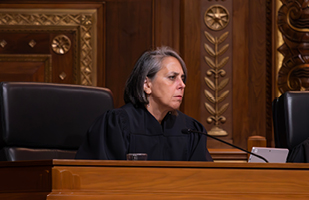Judge Examines Law’s Intricacies from Capitol Hill to Supreme Court

Eighth District Judge Lisa Forbes hears her first Supreme Court oral argument.

Eighth District Judge Lisa Forbes hears her first Supreme Court oral argument.
Eighth District Court of Appeals Judge Lisa B. Forbes has a deep appreciation for America’s experiment of democracy and how the laws of the first constitutional republic were created to equally protect and serve its people.
“I studied public policy in college and worked on Capitol Hill and in politics after I graduated. That experience gave me a broader understanding of how laws and policies are not only made but also how they impact people’s lives,” said Judge Forbes.
After law school and a federal judicial clerkship, Judge Forbes embarked on a career in private practice handling complex litigation. She spent 27 years working on intricate legal disputes in trial courts and appellate courts at the state and federal level. She was drawn to the intellectual challenge of complex litigation but quickly learned the real satisfaction of her work came from translating complicated legal concepts and complex facts to clients, courts, and juries.
In explaining her role as a former litigator, Judge Forbes said that she was “in a unique position to help people resolve the case before them and help them set up processes to avoid legal problems in the future.”
Her career took a turn in a different direction when she was elected to the Eighth District Court of Appeals in 2020. She was drawn to the bench to serve the broader community. As a judge, she is cognizant that “every opinion impacts not only the litigants, but also the law in general, how it grows and develops.”
Judge Forbes experienced the law at the state’s highest level when she heard her first oral argument for the Supreme Court of Ohio. She sat as a visiting assigned judge for Justice Jennifer Brunner, who recused. The Ohio Constitution gives the chief justice authority to select an appellate judge to sit for a Supreme Court justice when there is a recusal.
Judge Forbes heard State v. Taylor, which examines if an attorney notifies police and the prosecutor that a minor is represented, can police later question the minor without notifying the attorney. The case also asks if an adult court can convict a juvenile defendant of any offense rooted in a charge that was transferred from juvenile court. These constitutional questions are a reminder of why she pursued the legal profession and public service.
“We as a society generally agree to be governed by the rule of law. It is our duty within the judicial system to deliver the expectations of accountability and transparency to protect individual rights and liberties,” Judge Forbes said.


